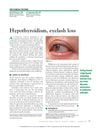Search
forLearn
5 / 12 resultslearn Epidermal Growth Factor
learn Finasteride
Frontline, gold standard treatment for combatting androgenic alopecia
learn Vitamin D
vitamin you should probably be taking for general health might also help your hair a little
learn Follistatin
glycoprotein that inhibits TGF-β and promotes hair growth by antagonizing activin
Research
5 / 1000+ resultsresearch Canine Alopecia Secondary to Human Topical Hormone Replacement Therapy in Six Dogs
Dogs exposed to their owners' hormone therapy developed hair loss, but symptoms resolved after stopping the therapy.

research Hypothyroidism and Eyelash Loss in a 77-Year-Old Woman
Eyelash loss can be a sign of thyroid problems.

research Hypothyroidism in Dogs
Hypothyroidism in dogs is usually caused by immune system issues or gland atrophy, affects middle-aged purebreds most, and is treatable with medication.

research Systemic Effects of Leucaena Leucocephala Ingestion on Ringtailed Lemurs (Lemur Catta) at Berenty Reserve, Madagascar
Ingesting Leucaena leucocephala caused hair loss and increased infant mortality in ringtailed lemurs.
research Toxicity of Leucaena Leucocephala
Feeding steers only Leucaena leucocephala causes severe health issues and poor weight gain.
Community Join
5 / 1000+ resultscommunity Topical T3 study - 1000% Growth. Anyone tried it?
The conversation discusses using T3 (triiodothyronine) as a topical treatment for hair growth, with some users noting it showed promising results in studies but lacked follow-up. Users express interest in trying T3 due to its potential effectiveness compared to Minoxidil.
community Interpreting pre-finisteride blood panels
The conversation is about someone planning to start finasteride for hair loss and wanting to interpret pre-treatment blood panels to assess the risk of side effects like gynecomastia. They list various tests to measure hormone levels and other health indicators.
community Pre-Finisteride DHT & Hormone Blood Panel
The conversation discusses the cost and insurance coverage of a comprehensive hormone and DHT blood panel for hair loss, with a focus on finasteride treatment. The user seeks a cheaper alternative to a $700 panel recommended in a video.
community Any advice/ alternatives after stopping Fin
A 25-year-old male experienced side effects from finasteride and stopped using it, continuing with minoxidil, vitamin D, and considering microneedling or laser therapy. He is exploring alternatives like topical dutasteride, RU58841, and possibly hair transplants or hair systems.
community 25 years on finasteride - my experience
A long-term finasteride user experienced side effects like sexual dysfunction, dry eyes, muscle weakness, and brain fog, which improved when they stopped the medication. They decided to stop finasteride again, questioning if maintaining hair was worth the negative impact on their well-being.